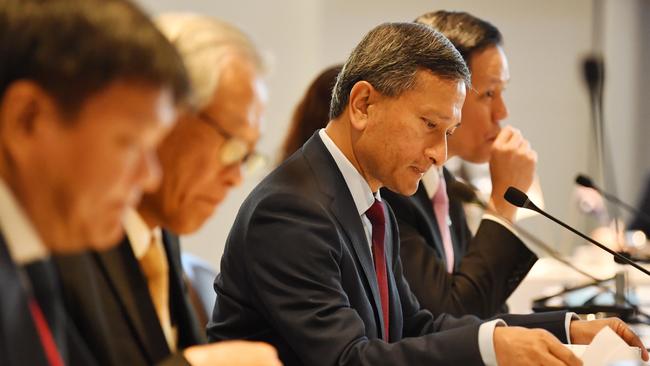Singapore breaks ranks imposes sanctions on Russia
The island state is the only Southeast Asian country to take a firm position against Vladimir Putin’s invasion of Ukraine.

Singapore will impose financial sanctions on Russia, it said on Monday, making it only the second Asian nation to do so after Japan and the only Southeast Asian country to take a firm position against President Vladimir Putin’s invasion of Ukraine.
Foreign Minister Vivian Balakrishnan told parliament “appropriate sanctions and restrictions” would be imposed to block some Russian banks and financial transactions, though did not specify whether the city state would join Western powers in locking Russia out of the SWIFT international payments system.
Mr Balakrishnan acknowledged it was an unusual move for Singapore, the region’s major financial centre, which “rarely acted to impose sanctions on other countries in the absence of binding UN Security Council decisions” and that it could expect blowback as a result.
“However, given the unprecedented gravity of the Russian attack on Ukraine, and the unsurprising veto by Russia of a draft Security Council resolution, Singapore intends to act in concert with many other like-minded countries to impose appropriate sanctions and restrictions against Russia,” he said.
“Unless we as a country stand up for principles that are the very foundation for the independence and sovereignty of smaller nations, our own right to exist and prosper as a nation may similarly be called into question one day.”
Singapore’s position, which will see it also impose export restrictions on items that may be used as weapons by Russia, stands out in a region renowned for fence-sitting. The Association of Southeast Asian Nations, of which Singapore is a member, issued a characteristically limp weekend statement calling on “all relevant parties to exercise maximum restraint” and pursue talks to contain “armed hostilities” and de-escalate tensions.
While Indonesia also has condemned the war, albeit without naming Russia, most ASEAN states – with the exception of the pariah Myanmar junta, which has cheered Russia’s actions as a demonstration of sovereign power – have issued only muted national statements.
Euan Graham, a senior fellow at Singapore’s International Institute for Strategic Studies’s Asia security program, says the crisis has exposed the “blinkered” approach of a region that mistakenly believes it won’t be directly affected.
It also had highlighted the vulnerability of several ASEAN nations reliant on Russia for military equipment and maintenance of legacy defence systems to sustain their own defence capabilities against potential Chinese aggression.
Dr Graham said fear of Moscow’s reaction was a factor in the bloc’s weak response to the invasion, amid rumours Russian ambassador were “explicitly using continuity of supply and maintenance for defence equipment” to dissuade shows of support for Ukraine.
But with Russia effectively locked out of the global financial system and likely to look to China as its lender of last resort, the power scales could soon tip in Beijing’s favour.
“If Southeast Asian countries are feeling the pressure from China, how reliable is Russia going to be if China starts putting pressure on Moscow not to supply new defence equipment or to go slow on existing legacy platforms?” he said. “The longer the conflict goes on, the greater the problem for Southeast Asia.”
Vietnam is the region’s most dependent on Russian weapons supplies and platforms, though Indonesia, Malaysia, Myanmar and The Philippines are vulnerable. India is even more reliant – a carry-over from its Cold War-era closeness with the Soviet Union – underscoring a general contradiction over the Western and Indian approach to China, “which is the West wants India to stand up to China but in order to do so they are using Russian arms”, Dr Graham said.




To join the conversation, please log in. Don't have an account? Register
Join the conversation, you are commenting as Logout